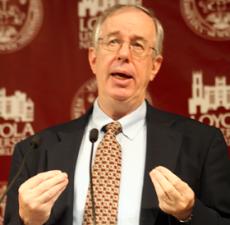A new argument in the endless debate on evolution versus creationism was presented at the first President’s Forum on Current Issues and Controversies.
The topic was on the question of cosmic purpose and intelligent design. The Monday night forum is one of three President’s Forums scheduled for this year.
The Rev. Kevin Wildes, S.J, university president, decided to initiate these forums in order to stimulate intellectual conversation around campus and in the local community. “It’s my job to be the intellectual leader around contemporary issues,” he said.
John F. Haught was the leading speaker at Monday’s forum. Haught is the Landegger Distinguished Professor of Theology at Georgetown University, and he specializes in systematic theology and is fluent in subjects of science and religion. He teaches intelligent design and believes that evolution and religion can coexist.
During his lecture, Haught discussed meaning as the most important and mystical component of the universe and the way to achieve meaning is through consciousness. “Consciousness is an unquestionable source of value and purpose is the actualizing of value. As complexity has increased on earth so has consciousness,” he said.
Haught leaned on the teachings of prominent philosophers Bertrand Russell and A.N. Whitehead, as well as other scientists, philosophers and theologians as support for his lecture. He stressed the responsibility of humans to increase their consciousness as much as possible.
“The possibility of a multiverse might make the future of consciousness a more promising one by expanding one’s idea of the universe,” Haught said.
Haught quoted A.N. Whitehead as saying, “At the very least the universe has aimed at the existence of beauty” and then said, “purpose is the universe’s aim towards beauty.”
The first responder to Haught’s lecture was Paul A. Nelson, a professor at Biola University and advocate for intelligent design. He spoke about what attracts people to researching and adopting the theory of intelligent design.
“Religion may or may not attract people to intelligent design, but before religion, it is personal agency which attracts them,” Nelson said. He defined agency as the sometimes-inexplicable human response to signals in life.
The second responder to Haught took the argumentative stance.
Barbara Forrest, is a professor of philosophy at Southeastern Louisiana University. Forrest is a religious skeptic and believes in Darwinism, and like Darwin, has an understanding, but not a belief, in religion.
She said that she appreciates the freedom that Haught’s work gives to the human intellect, but does not entirely agree with it. “The beauty of evolution is that it has produced imaginative capability and it has given us the intellectual capacity to imagine more complex entities,” Forrest said.
Wildes said he is excited about the President’s Forums and looks forward to the future. “After everything we went through last year, it’s good to get back to what we’re supposed to be doing as an institution of higher learning.”
Wildes said that he is joining with certain faculty to plan the next two forums to be held in the spring. The topics for the forums will be on immigration and racism. Wildes said that his selection of immigration for the next forum’s topic is because of its timeliness and prevalence nationally and locally, and he believes that both immigration and racism will always have a local interest.
Sally Tunmer can be reached at sktunmer@loyno.edu.






